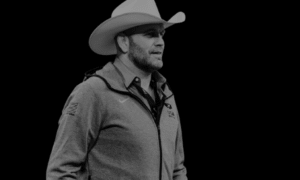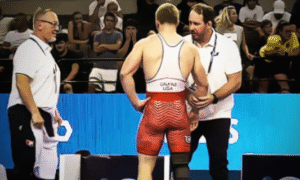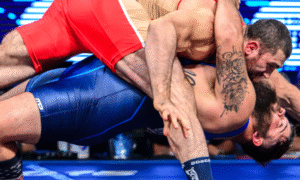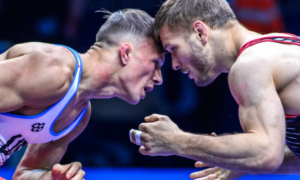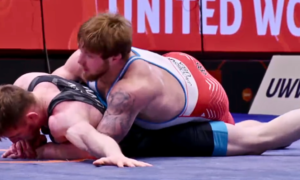How impactful are the 30 seconds that separate periods in a Senior Greco-Roman match? Do the words said matter as much as outsiders might imagine? Can the complexion of a bout change based on a few choppy sentences?
In the Corner aims to find out.
To begin this multi-part feature, we call upon the ever-reliable Robby Smith.
Smith, 34, was a four-time US World Team member and 2016 Rio Olympian over the span of a remarkable career that has now veered onto a different path. This past summer, Smith — whose final competition was a bronze-medal performance in Cuba last year — became the head assistant coach at the Community Youth Center in Concord, California. Important to note, for one of the two major figures discussed by Smith in this piece is Mark Halvorson, the influential former head of CYC who sadly passed away in February at the age of 57.
Along with Halvorson is the one other coach most closely-associated with the heavyweight’s on-the-mat exploits: ’76 Olympic gold and former US National Team resident coach Momir Petković. Both men played longstanding, pivotal roles throughout Smith’s tenure. Halvorson remains in a different category due to having coached Smith since childhood, but Petković was responsible for the international grooming that is especially important on the top level. One more factor would be the Olympic (& Paralympic) Training Center. Smith was boarded at the OPTC for a decade, where the foundation of his relationship with Petković was fully established.
The interpersonal dynamics among the three had no choice but to color how they interacted amid the heat of battle, which is, in part, what In the Corner is designed to explore. “The break”, “intermission”, or however one might refer to the :30 between periods, is often excluded from coverage and conversation; yet, plenty of athletes claim that a coach’s utterances are more important than for which they are given credit. This initial foray highlighting Halvorson and Petković would seem to support such a declaration.
In the Corner Vol. 1 – Robby Smith
The Voices
Mark Halvorson (Community Youth Center)
Momir Petković (fmr. US National Team Resident Coach)
“The 2005 Fargo freestyle finals. I had just won Greco and didn’t want to wrestle freestyle, but Halvorson asked me to wrestle freestyle. I went undefeated the first day, made the finals on the second day. In the finals match, I’m down 7-0 — but I had told him that although I would wrestle freestyle, I would not touch a leg. I’m not touching a leg. No way. I’m not going to do it. I made it all the way through the freestyle tournament without touching a leg.
“But I’m down 7-0 in the finals against a guy from Idaho early in the first period. He took a shot, leg-laced me, and it is 7-0 :30 into the match. Still, I was determined not to touch a leg. Eventually, he got a passivity, and I put him down and scored some points. But, I was still down a good amount.
“We get to the break and Halvorson walks over. ‘Robby, Robby, I understand that you don’t want to touch a leg. I understand. But please, can you please, just hit one high-crotch or one double? We do want to win the title here, so can you please grab a leg?’ (Laughs)
“In my mind, I’m like, My coach is practically begging me to touch a leg because I’m so stubborn. It was comical, right? With Greco stuff, all Halvorson had to do was look at me and I knew what he wanted. We had our little signals, touch one arm for one thing, touch the other arm for another thing. That’s how it would go. We were so in-tune with each other on the Greco side. Maybe he might say, Let’s start focusing and off of two-on-one’s, let’s go to underhooks, and that would be it.
“So when I walk over to the corner and have him basically begging me to grab legs, it was like, Whoa, whoa! What in the world is going on? This isn’t normal! Now I did actually end up winning that match and winning Fargo, but I did have to touch a leg or two.
“Over the course of my career, Halvorson could read the match so well. It was not big things that he would tell you such as, We have to start working the left-side underhook, the right side is failing you… We have to push-pull here… We were very much in-tune.
“Once I had begun my Senior career, that was when Momir (Petkovic) and Halvorson started working the corner together for me. This was one of the best things (laughs). I think it was the finals in 2013 against (David) Arendt. Halvorson comes over and he is trying to fan me with the towel to cool me down. All of the sudden, Momir rips it out of his hands and yells, ‘What are you doing?!’ They started going back-and-forth with each other (laughs). I was like, Guys, guys, we’ve got :30 here, let’s try to focus!
“Every time with Momir… I mean, we were just so blunt and honest with each other. He would call me out in the middle of match, saying stuff like, What are you doing? This is bull****. Why don’t you keep moving? Why isn’t your head up?
“The best corner with Momir, by far, was 2015 in the (World) bronze-medal match. I was losing (to Bilyal Makhov), the first period is winding down, and I am about to step out of bounds and get tech’ed — but I throw him. They (the officials) gave me two. The buzzer goes off and I’m in my corner, because I threw him right in front of Momir. I stand up and Momir is attacking me with the towel to wipe my face off. ‘We’ve got him right where we f****** want him!’ he screams. I’m down 7-2 in the World bronze medal match and that’s what he is saying (laughs). ‘He’s dead, he’s ours now!’ And he was right. Those next three minutes were a dogfight and helped make my career what it was, as far as my reputation for throwing. It was an eye-opener.

HOW IT HAPPENED: A familiar sight during most of Smith’s more pressing Senior-level matches included the presence of both Momir Petković (left) and Mark Halvorson (far right) as the two corner coaches. Here, Petkovic is fanning Smith with a towel between periods of the the latter’s bronze-medal match against Russian Bilyal Makhov at the 2015 World Championships, where in the eyes of many Smith was robbed of a victory via fall. (Photo: Tony Rotundo)
“In that moment, he said the absolute right thing. It is the bronze-medal match, I was losing, and he brought me back off the deck to where I was thinking, Yeah, I do have him right where I want him. He was telling me, ‘Look at him over there, he’s tired.’ And again, he was right. He (Makhov) was on the other side bent over at the waist, his coaches were trying to stand him up. This guy is mine, I thought. It was perfect. I had that adrenaline from having just hit that throw at the end of the first. That match just took off and points started going on the board. I started gaining and gaining. I lost, but it was this match where people outside of Greco really began to take notice of who I was.
“When you walk into that corner, sometimes it is not about receiving instructions. Sometimes, it’s just about positivity. Even when Momir would talk trash to me in the corner, I knew why he was doing it. He was doing it for a reason, to put a spark into me. To take my mind off of what I was doing in that moment, or if I was acting like a turd on the mat and not executing how I should have been. Because, then I’d become more pissed off at my coach for calling me a turd and set out to prove him wrong. He knew me so well. Both of my coaches throughout my career did. They could just manipulate me in certain ways and I would respond how they wanted me to.
“I mean, Halvorson wouldn’t just walk up to me between periods and say something like, This is bull**** right now, what the f*** are you doing? That wasn’t him, that was Momir (laughs). But when I had them together? It was so perfect. Momir would come at me and give me instructions, fanning me and fanning me while relaying what to do; and then Halvorson would just walk up into my ear and give me the key notes he had down, and I’d walk back out there and perform them. It was an amazing thing to have.
“A lot of people don’t understand how important a cornerman is, and how important those :30 can really become. If you utilize that time well, it can change a whole match. It can actually change an entire career. Like in 2015, people knew me, but my name wasn’t really out there. I’m getting beat by a Russian 7-0 in my own country in the first period, 7-2 at the break. Then I have a coach saying that we have him ‘right where want him’? And I believed him and bought into it? That’s why that match went out how it went. I was so confident in my coaches that I believed them. It was, Yeah, I have him right where I want him. It was like I was the one winning 7-0 and putting the throttle on him.
“Just talking about it makes me think about this. I try to be the same way in the corner. You don’t want to give too much information, but you have to understand your athlete when it might be the biggest :30 of their career. It’s pretty awesome, actually.”
Influence & Behavior
“I’m a happy-go-lucky guy. When I’m on the mat, do I want to kill you? Yes, of course. But when I go into the break, we’ll have the conversation. It could be a joke coming at me, or whatever. Everyone thought I was crazy because I’d slap myself in the face a bunch of times and do all of that to get myself psyched up. But when I am in the grind of it and really embracing the fight? I walk into that corner and I’m loving it. I’m happy. I’m having fun. It’s a good time. That is one thing Halvorson used to ask, ‘Are you having fun?’ And it was like, Yeah, this puts a smile on my face.

Halvorson (bottom, left) and Petković both coached Smith at the ’16 Olympic Games. As was near customary, Smith is witnessed smiling in the corner before resuming a match after the :30 break. (Photo: Tony Rotundo).
“Also, I’m a big believer in posture, in faking it. Sometimes you walk into that corner and you’re dog-tired. But if that guy in the other corner looks over at me and I’m smiling, laughing, and having a good time? If he sees me having a good time :30 before I go back out there to piss-pound him? That’s going to break you. That is a mental edge. If I smile and wink at you and we just went three minutes of hard wrestling? Then they think, Why is he smiling? Why is he laughing? You have blood in the corner of your mouth, so why are you laughing? I’m having fun, but I am going to change my posture so you can’t tell if I’m hurting. If you can sense that I’m hurting, well then that’s just blood in the water.”

Listen to “5PM50: Mr. Fantastic Benji Peak” on Spreaker.
Listen to “5PM49: Robby Smith on coaching, fatherhood and mentors” on Spreaker.
Listen to “5PM48: Austin Morrow and Gary Mayabb” on Spreaker.
SUBSCRIBE TO THE FIVE POINT MOVE PODCAST
iTunes | Stitcher | Spreaker | Google Play Music





